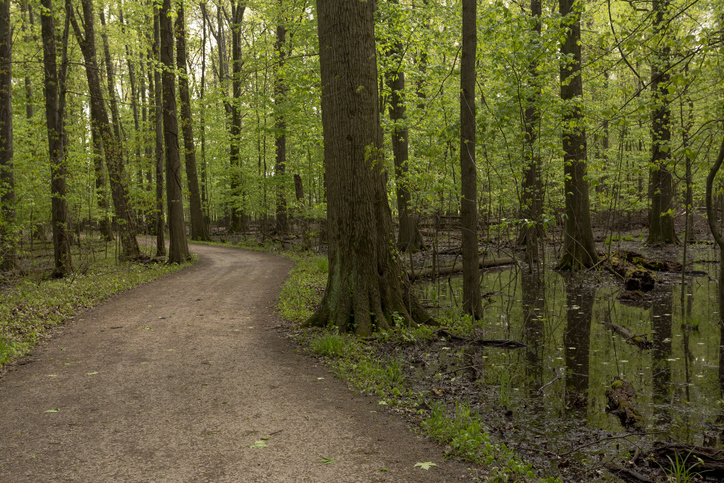State Should Allocate Part of Green Bond Funds for Natural Heritage Program
March 24, 2024
Bill H6342, passed in 2023, created a “Legislative Study Commission to Evaluate and Provide Recommendations on Proper Forest Management for Fire Prevention,” in response to last year’s fire in the Queen’s River Preserve in Exeter.
I believe this commission was created for one main purpose, to use wildfire as an excuse to justify the expansion of Rhode Island’s timber industry.
The commission throughout its meetings has pushed the unscientific notion that forest management (logging) prevents wildfires.
I testified at every single hearing, the only member of the public to do so, where I revealed evidence that I believe shows the Queen’s River fire started in a clear-cut created by The Nature Conservancy and the Natural Resources Conservation Service.
In the fire study commission’s draft report under findings, it says, “Invasive diseases and insects have contributed to excessive dead wood exacerbating the risk and severity of forest fires.”
According to forest ecologists David Foster and David Orwig of Harvard Forest, “New England forests do not commonly experience insect outbreaks that lead to large accumulations of hazardous fuels as the southern or western United States do.”
At the final hearing, I told the commission that DEM for decades has been creating a fire hazard in our state forests through its logging practices due to the flammable logging slash that is left behind and the underbrush that grows soon after due to the opened-up tree canopy.
Logging also makes the forest drier and more exposed to wind due to the opened-up tree canopy, allowing more sunlight through compared to an undisturbed mature forest with an intact tree canopy keeping the forest floor cool and wet, and keeping wind out.
In its draft report, the commission completely left out my findings, and a presentation from legislative counsel which revealed that Rhode Island ecologically has one of the lowest fire risks in the country.
Instead, the report encourages more forest management, which I believe will create a greater fire hazard, perhaps another large fire. Another result of this report is House bill H7728, misleadingly called the “Comprehensive Fire Safety Act,” which would mandate that all private landowners who own 500 acres or more, including conservation organizations, must have a forest management plan for fire mitigation to be approved by DEM.
Since DEM’s fire mitigation plans almost always include logging and prescribed burning, if this bill is passed, it could force all private landowners owning 500 or more acres, including organizations like the Audubon Society of Rhode Island and The Nature Conservancy, to log and burn the forests on their land.
The 2023 Forestry and Forest Product Operations bill, H5784, has been reintroduced this year as H7618, “The Forest Parity Act,” which, like H5784, removes the sales tax as well as the use tax on forest product equipment including chainsaws and logging trucks, and expands the zoning of where logging can take place to all zoning districts.
Another bill, H7729, would define agricultural land in a state statute regarding DEM as “land used for forestry or timber production.”
I believe clear-cut logging is currently taking place on DEM land under the guise of fire prevention, which is being funded through the 2022 Green Bond under the misleading name, “Forest and Habitat Restoration.” The reality is that forests are being destroyed, not restored, and in the process this logging creates a fire hazard through the dry, flammable logging slash left behind.
Lastly, a bill to add $16 million to this year’s Green Bond, H7550, includes $3 million allocated to what I believe are logging projects including clear-cutting on state land under the misleading label “Forests and Habitat Management.”
Instead, I believe this $3 million in the Green Bond proposal should go toward creating a fully funded Rhode Island Natural Heritage Program to monitor and protect biodiversity. This Natural Heritage Program would be created in state law through the Old Growth Forest Protection Act bills H7293 and S2299.
I call on all of the state’s environmental groups to oppose these bills, to push to amend the Green Bond proposal to have it instead be allocated to fund the Natural Heritage Program, and to support the Old Growth Forest Protection Act so we can finally have state laws protecting forests and biodiversity.
Nathan Cornell is president of the Old Growth Tree Society.
Categories
Join the Discussion
View CommentsRecent Comments
Leave a Reply
Your support keeps our reporters on the environmental beat.
Reader support is at the core of our nonprofit news model. Together, we can keep the environment in the headlines.
We use cookies to improve your experience and deliver personalized content. View Cookie Settings




Mr Cornell has conflated the issues. RI does need to expand its lumber industry we use wood, we produce wood, lets use it well. That is an issue separate and distinct from banning cutting in the very few and tiny blocks of forest that could b considered old growth. Clearcutting is not a particularly useful practice in hardwood forests. A simple bill to ban the practice in RI is reasonable, but not when attached to all the extraneous stuff. Cornell also wants to create new and excessive state bureaucracies mostly because of his dislike for DEM. Personal vendettas are no reason to waste taxpayer money. If he offered us a clean bill, to protect old growth forests. It would be easy to support. His arguments on good forest practices are contestable. Legislating one or another of these contested options seems to create a situation where I am inclined to go with the professionals managing the forest rather than what passes the legislature. Mostly what RI needs is a bill that will encourage us to both use and grow more forests. Too much emphasis on stopping cutting will harm rural economies.
Mr. Cornell downplays the significant threat of insects and disease to our forests. In 2021 & 2022 parts of southern New England had a spongy moth (formerly called gypsy moth) infestation. At that time defoliated trees could be seen along our roadways and some of our forests still have large swaths of dead trees in them. The TNC’s Carter Preserve is a location where the severe damage is still visible. Hiking trails that once had no understory get overgrown because of the lack of a tree canopy.
Any legislation that would restrict the logging of these dead trees is not in the best interests of the forests. The dead trees present a similar fire threat to clear cutting. The wood is dry and the ground dries out for lack of shade.
We need to protect our healthy trees, especially the old growth. A sensible forest management plan is needed to deal with the dead trees and protect the living ones.
what timber industry?? in RI?? lol
Oh, fun, another Cornell piece! This dude has more conspiracy theories than Alex Jones. Can’t wait to see what the next one is.
Greg,
You are the last person I would expect to be a supporter of the logging industry. From your August 2023 ecoRI article:
“In many ways the obsession with the business climate instead of the real climate reflects the power of mining, drilling, forestry, real estate, and manufacturing in our politics.”